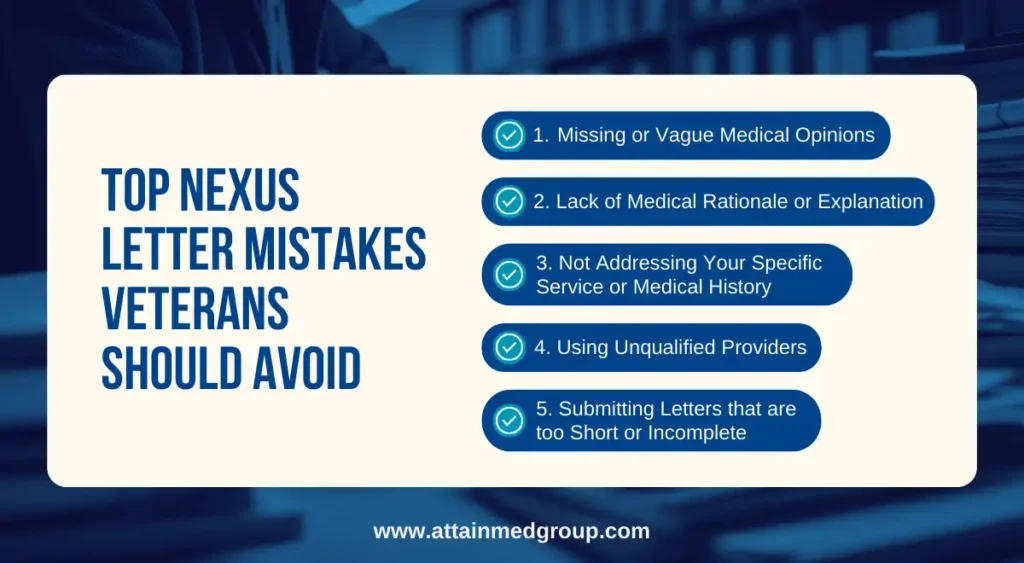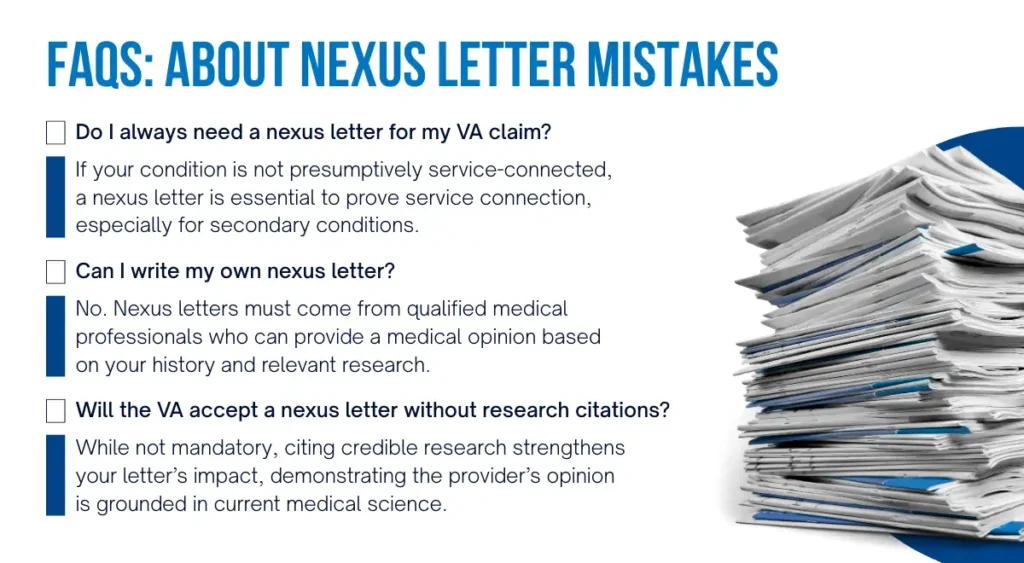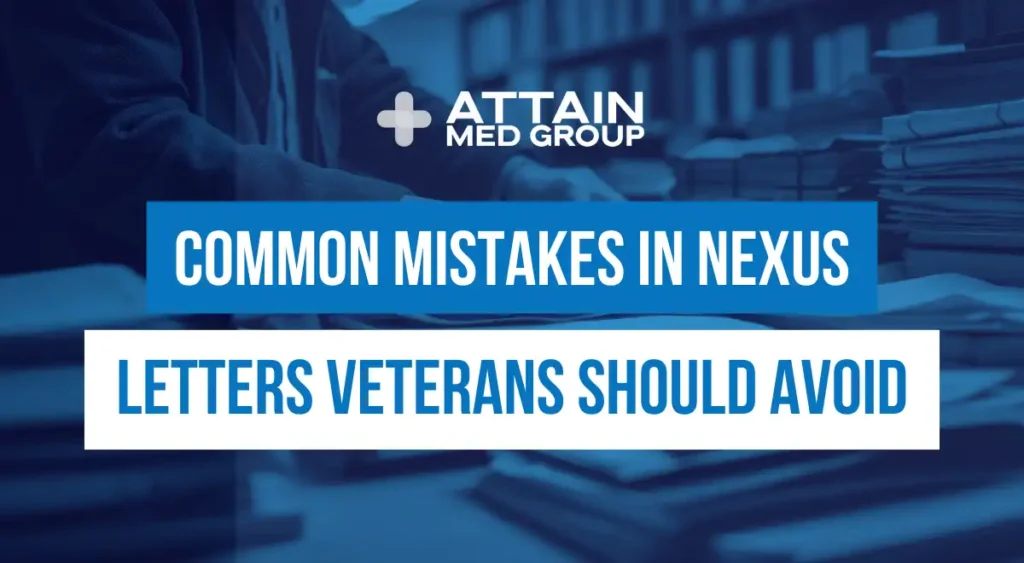A nexus letter can make or break your VA disability claim. Even if you have a clear diagnosis and documented symptoms, the VA often denies claims due to inadequate, unclear, or poorly structured nexus letters.
At Attain Med Group, we help veterans secure benefits they’ve earned by crafting expert-level, VA-compliant nexus letters that avoid common pitfalls. If you’re searching for “nexus letter mistakes” after a denial or are preparing your first claim, this guide will show you what to watch for so you can avoid costly delays and rejections.
Why a Proper Nexus Letter Matters
The VA requires credible medical evidence linking your current diagnosis to your service or to a service-connected condition. This link, or “nexus,” must be clear, medically grounded, and formatted in a way the VA understands.
What Makes a Strong Nexus Letter?
A nexus letter is more than a statement from a doctor; it is a carefully crafted medical opinion aligned with VA standards that can be the deciding factor in your claim’s approval.


✅ Bridges Gaps in Your Medical and Service Records
Many veterans have:
- Missing or incomplete service treatment records.
- No in-service diagnosis despite experiencing symptoms.
- Delayed treatment after discharge due to stigma or lack of resources.
A well-written nexus letter fills these gaps by explaining how your current diagnosis is medically connected to your service, even if your documentation is incomplete.
For example:
“Although the veteran did not seek treatment for PTSD symptoms during service, their reported in-service traumatic events align with current diagnostic criteria and symptom presentation, supporting the diagnosis.”
✅ Uses VA-Compliant “At Least as Likely as Not” Language
The VA requires medical opinions to meet a specific legal threshold of proof to grant service connection. Phrases like “possibly related” or “could be due to” are too vague and are often dismissed.
A strong nexus letter uses clear, VA-compliant language, such as:
“It is at least as likely as not (a 50% probability or greater) that the veteran’s [condition] was caused or aggravated by their military service.”
Using the correct language ensures your evidence meets the VA’s standard for service connection, reducing the risk of denial due to insufficient phrasing.
✅ Cites Credible Medical Rationale and Research
Your nexus letter should explain the medical reasoning connecting your condition to your service or to a primary service-connected condition.
A strong nexus letter will:
- Reference peer-reviewed medical studies (e.g., Sleep Medicine Reviews on PTSD and sleep apnea).
- Explain recognized medical pathways (e.g., how diabetes can lead to peripheral neuropathy).
- Tie the medical rationale back to your specific history and symptoms.
This demonstrates to the VA that the connection is not speculative but is grounded in current medical science.
✅ Increases Your Chances of Claim Approval and Back Pay
Ultimately, a strong nexus letter:
- Strengthens your claim by providing credible, professional medical evidence.
- Helps the VA adjudicator understand the connection without guesswork.
- Can turn a previously denied claim into an approved one during appeal or supplemental review.
- Increases your chances of receiving back pay from your effective date, ensuring you get the compensation you deserve.
A weak nexus letter can lead to:
🚫 Denials for “lack of nexus.”
🚫 Extended appeals and frustration.
🚫 Missed compensation you deserve.


1️⃣ Missing or Vague Medical Opinions
Problem: The letter does not clearly state the medical provider’s opinion that your condition is “at least as likely as not” caused or aggravated by your service.
Why it matters: VA raters need a clear, direct statement using VA-compliant terminology. Phrases like “possibly related” or “could be connected” are too vague and often result in denials.
Avoid it by: Ensuring your provider uses:
“It is at least as likely as not that the veteran’s [condition] is related to their military service.”
2️⃣ Lack of Medical Rationale or Explanation
Problem: The letter simply states the condition is connected to service but fails to explain why.
Why it matters: The VA requires a logical, medically sound explanation supported by evidence showing how your service or service-connected condition caused or aggravated your current condition.
Avoid it by:
✅ Including a detailed medical explanation (e.g., how PTSD contributes to sleep apnea through hyperarousal and disrupted sleep).
✅ Citing relevant research or recognized medical pathways to strengthen the connection.
3️⃣ Not Addressing Your Specific Service or Medical History
Problem: The letter uses generic language and does not reference your individual records, service history, or documented symptoms.
Why it matters: The VA will not consider the nexus credible if it doesn’t align with your documented history.
Avoid it by:
✅ Having your provider reference specific incidents, diagnoses, and treatment records from your service and post-service care.
✅ Ensuring consistency between your nexus letter, your personal statements, and your VA claims file.
4️⃣ Using Unqualified Providers
Problem: Letters from providers without appropriate credentials (e.g., non-physician letters or letters from providers outside the specialty relevant to your condition) may carry less weight.
Why it matters: The VA considers the competency and expertise of the medical provider when weighing evidence.
Avoid it by:
✅ Obtaining your nexus letter from a qualified, licensed medical professional in the relevant specialty (e.g., a neurologist for migraines, a sleep specialist for sleep apnea).
✅ Working with organizations like Attain Med Group, which ensures your nexus letter comes from credentialed, VA-knowledgeable providers.
5️⃣ Submitting Letters That Are Too Short or Incomplete
Problem: A one-paragraph letter is unlikely to provide sufficient detail for the VA to approve your claim.
Why it matters: The VA needs enough information to understand your condition, your history, and the medical reasoning behind the connection.
Avoid it by:
✅ Ensuring your nexus letter includes:
- A clear statement of the connection.
- Your medical history and service-related factors.
- Detailed medical reasoning with citations when applicable.
- The provider’s credentials and signature.


Avoiding common nexus letter mistakes is not just about improving paperwork—it directly impacts your financial security, your peace of mind, and your future.
Here’s how:
✅ Prevent Unnecessary Denials and Appeals
Many veterans face years of frustration and appeals because their initial nexus letter lacked clear language, medical rationale, or proper structure. Each denial:
- Delays your benefits.
- Forces you into additional evidence requests, appeals, or hearings.
- Extends financial and emotional strain on you and your family.
By submitting a well-crafted, VA-compliant nexus letter from the start, you reduce the likelihood of denials due to “lack of nexus,” moving your claim forward efficiently.
✅ Strengthen Your Claim with Well-Supported Evidence
The VA weighs claims based on evidence quality. A clear, credible nexus letter:
- Fills gaps in your medical and service records.
- Clearly explains how your condition is linked to your service.
- Demonstrates that your claim is medically grounded and not speculative.
This strengthens your claim, making it easier for the VA to approve without unnecessary delays.
✅ Potentially Increase Your Back Pay and Overall Compensation
The effective date of your claim often determines how much back pay you receive. A denial due to an insufficient nexus letter can push your approval further into the future, reducing your retroactive benefits.
By avoiding nexus letter mistakes, you increase the likelihood of earlier approval, which can:
- Maximize your back pay from your original effective date.
- Secure higher monthly compensation for your service-connected conditions.
✅ Reduce Stress and Uncertainty During the Claims Process
VA claims are stressful, especially when dealing with health conditions that impact daily life. The uncertainty of:
- Waiting for decisions,
- Facing denials, and
- Navigating appeals can take a toll on your mental health and stability.
A strong, mistake-free nexus letter reduces this uncertainty by:
- Providing clear evidence to the VA.
- Moving your claim forward faster.
- Giving you confidence that your case is supported by solid medical reasoning.
Why This Matters
Your VA claim isn’t just paperwork; it’s about:
- Financial security for you and your family.
- Access to healthcare and resources.
- Recognition of your service and sacrifices.
By avoiding common nexus letter mistakes, you empower yourself to secure the benefits you have earned while reducing the delays, stress, and denials that frustrate so many veterans.
Real-World Example
A veteran with PTSD and sleep apnea received multiple denials because their previous nexus letters simply stated, “Sleep apnea is related to PTSD,” without explaining the medical connection. After working with Attain Med Group, the veteran received a detailed nexus letter that:

When a veteran pursued a sleep apnea secondary to PTSD claim, their previous denials were due to vague nexus letters lacking clear medical explanation and documentation. After partnering with Attain Med Group, the revised nexus letter included these critical, VA-aligned elements:
✅ Explained How PTSD Hyperarousal Contributes to Airway Instability During Sleep
The nexus letter clearly outlined the medical pathway connecting PTSD to obstructive sleep apnea (OSA). It explained:
- PTSD causes hyperarousal and chronic stress, leading to disrupted sleep architecture.
- Elevated stress hormones and sympathetic nervous system activation contribute to increased muscle tension and fragmented sleep, predisposing the airway to collapse.
- PTSD-related weight gain (due to cortisol dysregulation and medication side effects) further increases airway obstruction risk during sleep.
This bridges the gap for VA raters, showing how PTSD can cause or aggravate sleep apnea even if the conditions were diagnosed separately.
✅ Cited Sleep Medicine Reviews (2018) and VA Research to Support the Link
Rather than being a subjective opinion, the nexus letter:
- Cited Sleep Medicine Reviews (2018), which found a higher prevalence of OSA among veterans with PTSD.
- Referenced Journal of Clinical Sleep Medicine (2016), highlighting that PTSD hyperarousal contributes to upper airway instability during sleep.
- Included VA Research Currents (2020) findings showing that veterans with PTSD are at higher risk for developing sleep apnea, with severity correlated to PTSD symptom intensity.
Using peer-reviewed, credible studies strengthened the letter’s authority, showing the connection is medically recognized and research-supported.
✅ Used VA-Compliant Language
The nexus letter included the required VA legal standard, stating:
“It is at least as likely as not (a 50% probability or greater) that the veteran’s obstructive sleep apnea is caused by or aggravated by their service-connected PTSD.”
This precise phrasing meets VA evidence requirements, preventing denials based on vague or noncompliant language like “might be related” or “could be connected.”
✅ Aligned With the Veteran’s Service and Medical Records
Finally, the letter tied all medical reasoning back to the veteran’s unique history, referencing:
- Documented PTSD diagnosis and ongoing treatment.
- Reports of sleep disturbances, nightmares, and chronic hypervigilance.
- Weight gain correlated with PTSD medication usage.
- The veteran’s lay statements about worsening sleep quality following PTSD symptom onset.
By aligning medical opinion with the veteran’s service treatment records, post-service treatment notes, and lay evidence, the nexus letter became a cohesive, credible piece of evidence the VA could not ignore.
The result? The VA approved the secondary claim, granting service connection and back pay.
Why This Approach Works
By including:
✅ Clear medical pathways,
✅ Research-backed evidence,
✅ VA-compliant language, and
✅ Alignment with personal medical history,
The nexus letter transformed a previously denied claim into an approved secondary service connection for sleep apnea, securing the veteran’s benefits and back pay.


A well-crafted, evidence-based nexus letter is often the difference between approval and denial of your VA disability claim. Avoiding these common mistakes ensures your claim is taken seriously by the VA and supported by strong, credible medical evidence.
At Attain Med Group, we:
✅ Provide VA-compliant nexus letters that avoid the pitfalls described above.
✅ Use up-to-date medical research to support your case.
✅ Work with credentialed, experienced medical professionals who understand VA requirements.
Ready to Strengthen Your VA Claim?
If you are dealing with a denied claim or want to avoid delays:
✅ Contact Attain Med Group today for a consultation.
✅ Download our free “VA Nexus Letter Checklist” to prepare for your next step.
✅ Get the evidence you need to secure the benefits you deserve.


